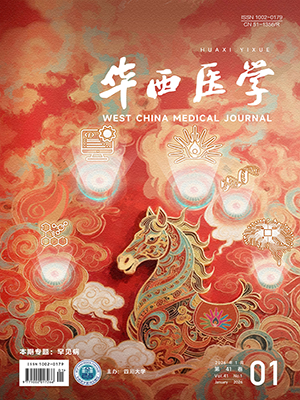【摘要】 目的 〖JP2〗研究質子泵抑制劑(PPI)是否為危重患者發生醫院獲得性肺炎的危險因素。 方法 收集2002年6月-2009年6月收治的198例重癥患者資料,分為使用PPI組(96例)和未使用PPI組(102例)。采用logistic回歸分析PPI使用情況和醫院獲得性肺炎的關系。 結果 使用PPI組肺炎的發生率較高(26.9%),尤其是PPI使用時間超過7 d者(37.5%)。在不同的多變量logistic回歸模型中,分別用APACHE Ⅱ評分和入住重癥監護室原因校正后,使用PPI以及使用天數均是醫院獲得性肺炎發生的危險因素(P=0.031,OR=2.230,95%CI:1.957~2.947;P=0.002,OR=1.824,95%CI:1.457~2.242)。 結論 長時間應用PPI可能是增加ICU患者發生醫院獲得性肺炎的一種風險因素。
【Abstract】 Objective To identify whether proton pump inhibitors (PPI) is a risk factor of hospital-acquired pneumonia (HAP) in critical patients. Methods The clinical data of the critical patients admitted to ICU from June 2002 to June 2009 were retrospectively analyzed. A total of 198 patients were divided into two groups: 96 in PPI group and 102 in non-PPI group. The relationship between PPI and HAP was analyzed by logistic regression. Results The patients in PPI group had a higher risk of HAP (26.9%), especially who were treated with PPI more than 7 days (37.5%). Adjusted by APACHE Ⅱ score and reason for admission to ICU, PPI therapy and the using duration of PPI were both the risk factors of HAP in different multiple logistic models (P=0.031, OR=2.230, 95%CI: 1.957-2.947; P=0.002, OR=1.824, 95%CI: 1.457-2.242). Conclusion Long-term use of PPI is a risk factor of HAP.
Citation: WANG Xiaohong,WANG Yu,WU Lianan. Relationship Between Using Proton Pump Inhibitors and the Hospital-acquired Pneumonia in Critical Patients. West China Medical Journal, 2010, 25(10): 1811-1812. doi: Copy
Copyright ? the editorial department of West China Medical Journal of West China Medical Publisher. All rights reserved




